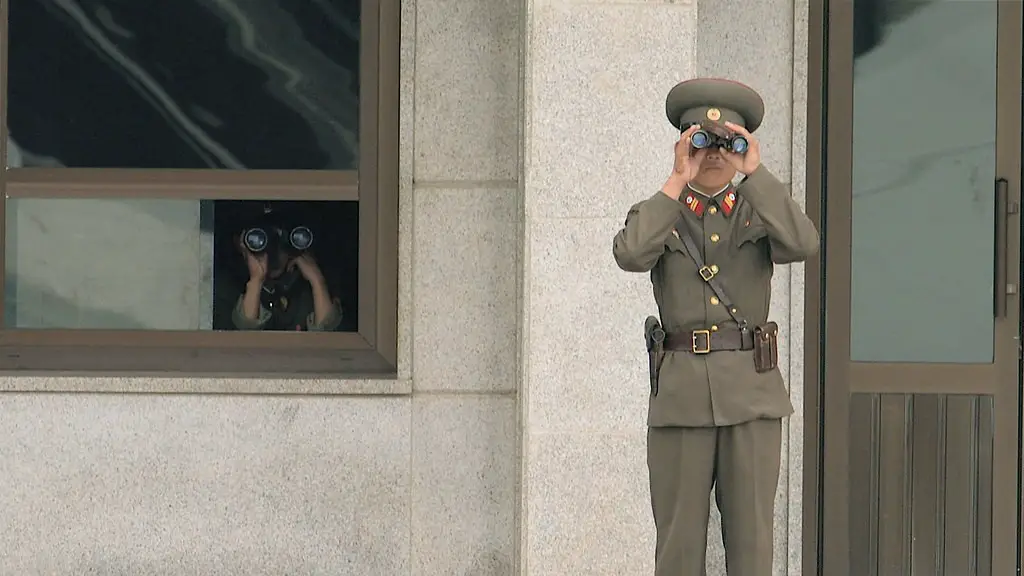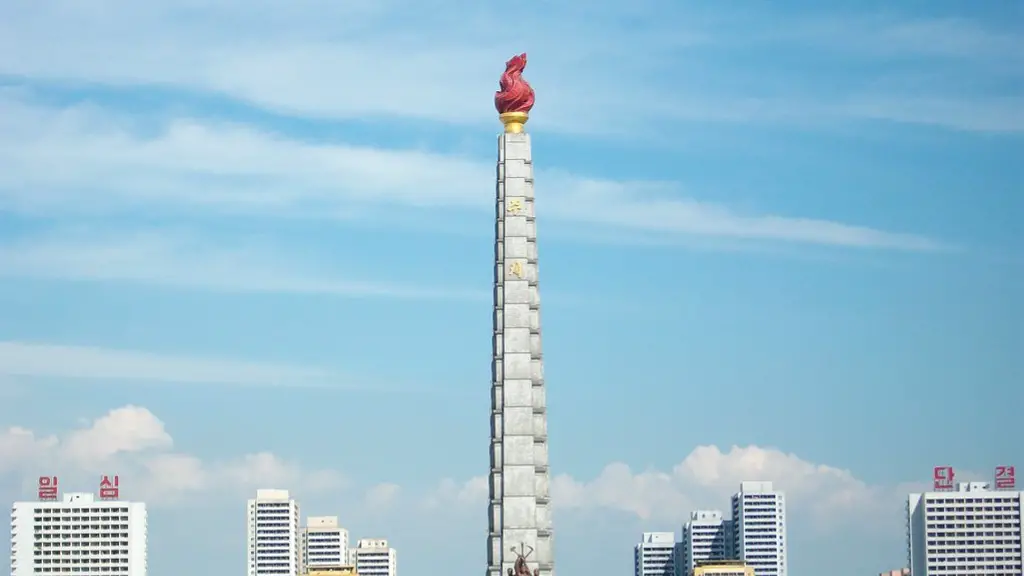The country of North Korea has been a source of contention for the United States for many years. In the past, the US has tried many different approaches to bring North Korea back into good diplomatic standing; however, every effort has had limited success. Recently, the US and North Korea have been engaging in new talks, with the ultimate goal of denuclearizing the Korean peninsula. There are many challenges and concerns surrounding this process, and it is important to evaluate the potential consequences to determine the best course of action. This article will examine the current state of the US-North Korea relationship and explore potential solutions to the ongoing issues.
In recent years, North Korea has been increasing its nuclear and missile capabilities, leading to tensions with the US and other countries. North Korea’s nuclear arsenal is estimated to include upwards of 60 nuclear weapons, making it one of the most powerful nuclear powers in the world. North Korea’s recent actions have led to fears that the country could create nuclear weapons that could potentially be delivered to the US mainland. Additionally, North Korea’s use of nuclear-capable missiles has led to increased military and political tensions in the region.
Due to the complexity of the situation and the stakes involved, it is important to consider the potential solutions to the ongoing US and North Korea conflict. The most feasible solution is the use of diplomacy, including economic sanctions and the enforcement of existing sanctions. The United Nations has already imposed several rounds of economic sanctions on North Korea in recent years. Additionally, the US has imposed a variety of sanctions, including limiting oil imports and cutting off access to international banking services.
Another potential solution is the use of military action. Although the US has made clear that it does not desire a war, it is possible that military action may become necessary. President Trump has stated on several occasions that “all options are on the table” in regards to dealing with North Korea. It is possible that US military action could be used in combination with diplomatic measures to bring the North Korean regime to the negotiating table.
A third potential solution to the US and North Korea conflict is the use of backchannel diplomacy. Various countries, including the United States, China, South Korea, and Japan have come together to negotiate with North Korea. Backchannel diplomacy has been used in the past to facilitate dialogue between countries, and it is possible that it could be used to make progress in the current US and North Korea situation.
It is also important to consider the potential risks and consequences of any potential solution to the conflict between the US and North Korea. Any military action would undoubtedly lead to civilian casualties and could potentially escalate the situation beyond the point of control. Additionally, any economic sanctions could lead to a collapse in the North Korean economy and widespread suffering among the population. Diplomatic measures, while safer than military action, may also have unintended consequences if not handled properly.
At this time, it is difficult to determine the best course of action for the US and North Korea. Regardless of the action taken, the situation is highly complex and could easily spiral out of control. Ultimately, the US must carefully evaluate the potential consequences of any action and make a decision that is in the best interests of both countries and the entire region.
The Role Of US Allies
When determining the best course of action in regards to the US and North Korea, it is important to consider the role that US allies will play. South Korea, Japan, as well as China and Russia all have a stake in the conflict and could have a major impact on the outcome. South Korea and Japan have been long-standing US allies, and the two countries have been engaging in joint military exercises and diplomatic initiatives with the US in an effort to resolve the situation. Additionally, China is North Korea’s closest ally, and its influence on the regime could be critical in finding a peaceful solution.
It is also important to consider the role of Russia in this conflict. Russia has historically been an ally of North Korea and has been instrumental in providing economic and military aid to the regime. Additionally, Russia’s influence on the North Korean regime could be used to encourage the regime to come to the negotiating table and begin talks on denuclearization.
In conclusion, the US and its allies have an important role to play in resolving the current rift with North Korea. Although the situation is highly complex, it is possible that a combination of diplomatic and military measures could bring the regime to the negotiating table and lead to a peaceful resolution. It is crucial that the US and its allies remain vigilant and continue to work together in order to achieve peace for the region.
The Humanitarian Crisis In North Korea
When evaluating the best course of action for the US and North Korea, it is also important to consider the humanitarian crisis that is ongoing in the country. North Korea is currently one of the most isolated countries in the world, and the government has been accused of human rights abuses, including torture, exploitation, and political repression. Additionally, the country is facing an extreme food and water shortage, with millions of people in danger of starvation.
It is important to note that any potential US action in regards to North Korea must take into consideration the humanitarian crisis in the country. The goal of any US policy should be to bring the region to a place of peace, while also alleviating the suffering of the North Korean people. Any potential US action must be undertaken with the understanding that the North Korean people are in desperate need of humanitarian aid.
It is also important to consider the potential consequences of US action in regards to the humanitarian crisis. Any military action taken against the North Korean regime could have devastating consequences for the people of North Korea. Additionally, diplomatic measures such as economic sanctions may also have unintended consequences, leading to a further deterioration of the situation in the country.
In conclusion, the humanitarian crisis in North Korea must be taken into account when determining the best course of action for the US and North Korea. Any potential US action must be evaluated with respect to its impact on the people of North Korea and its ability to ultimately bring the region to a place of peace. It is also important to consider the potential consequences, such as increased suffering for the North Korean people.
The Impact of Sanctions On North Korea
Another important consideration when evaluating potential solutions to the US and North Korea conflict is the impact of economic sanctions. The international community has already imposed numerous rounds of economic sanctions on the North Korean regime in an effort to curb their nuclear capabilities. It is important to consider the effectiveness of these sanctions, as well as the potential consequences of further sanctions.
A common argument against imposing economic sanctions on North Korea is that they are ineffective and only serve to further harm the North Korean people. It is also argued that sanctions are more likely to strengthen the North Korean regime’s control over the population than weaken it. Additionally, some argue that there is no clear evidence that economic sanctions have had any impact on North Korea’s nuclear program.
On the other hand, there is some evidence that sanctions have been effective at forcing the North Korean regime to the negotiating table. After numerous rounds of sanctions, North Korea was eventually willing to participate in talks over its nuclear weapons program. Additionally, there is some evidence that the sanctions are having an economic impact on the regime and could ultimately lead to economic collapse.
In conclusion, it is important to consider the impact of economic sanctions when determining the best course of action for the US and North Korea. While there is evidence that sanctions have had some impact on the regime, it is also important to consider the potential consequences for the North Korean people. Ultimately, any potential US action must be evaluated with respect to its potential effect on the humanitarian crisis in North Korea.
Incentivizing North Korean Diplomacy
It is also important to consider how to incentivize North Korea to take part in talks with the US and other countries. North Korea has so far been reluctant to take part in talks, and there is a need to find ways to entice the North Korean regime to come to the negotiating table. One potential solution is to offer North Korea incentives such as economic assistance, access to international banking systems, or increased diplomatic engagement in exchange for their cooperation.
Another potential solution is for the US and its allies to offer North Korea security guarantees. It is possible that the US and its allies could make a commitment not to seek regime change, and to refrain from any military action against North Korea. Additionally, the US could offer to reduce economic sanctions or provide economic assistance in exchange for the cessation of North Korea’s nuclear program.
Finally, it is important to consider the role of China in this conflict. China is North Korea’s closest ally, and its influence on the regime could be critical in convincing the North Korean regime to come to the negotiating table. China could be incentivized to pressure the North Korean regime to take part in talks by offering increased diplomatic and economic engagement.
In conclusion, there are a variety of potential solutions to incentivizing North Korea to engage in talks. It is important to consider the potential benefits and consequences of all potential solutions, as well as the role of US allies, before determining the best course of action.
The Negotiating Table
The ultimate goal of any US action towards North Korea is to bring the regime to the negotiating table, and begin talks over denuclearization. It is important to consider the potential obstacles that could prevent North Korea from coming to the negotiating table, as well as any potential solutions to overcoming these obstacles.
One major obstacle to negotiations is the lack of trust between the US and North Korea. The two countries have had a long and contentious history, and neither side is willing to fully trust the other. Additionally, there is a great deal of mistrust between the US and other actors involved in the conflict, such as China and Russia.
In addition to the lack of trust, there is the issue of incentives. North Korea is unlikely to come to the negotiating table without some kind of incentive, and the US must be willing to offer something that is attractive to the regime. Additionally, it is possible that the US and its allies could offer incentives to other countries and actors, such as China and Russia, in an effort to convince them to pressure the North Korean regime to begin talks.
Finally, it is important to have an understanding of the ideal goals of the negotiations. The US and its allies must be clear on their objectives and must be prepared to take a firm stance in negotiations. Additionally, there must be a plan in place for the implementation of any potential agreements. It is crucial that the US and its allies maintain a united front during the negotiations to increase the chances that a viable agreement can be reached.
In conclusion, it is important to consider the potential obstacles to the US and North Korea coming to the negotiating table, as well as potential solutions to overcoming these obstacles. Ultimately, the US and its allies must come to an understanding of the objectives and goals of the negotiations, and must maintain a united front in order to increase the chances of a successful agreement.





